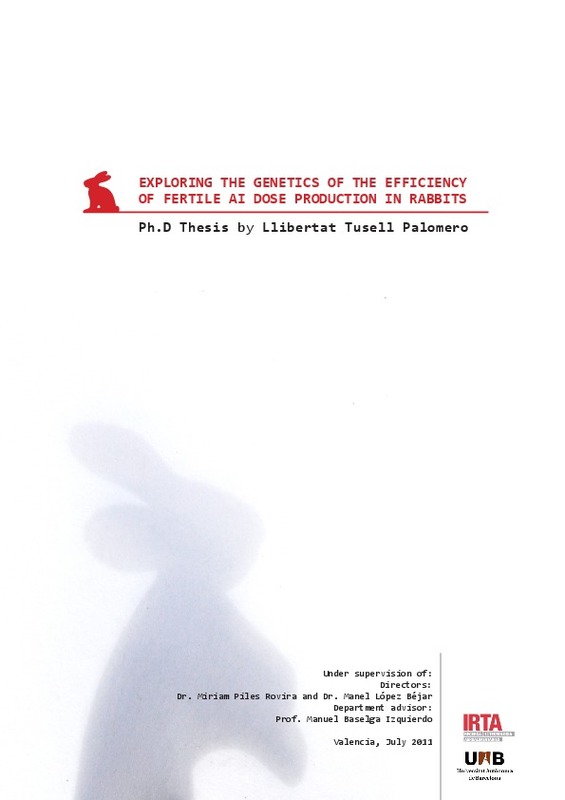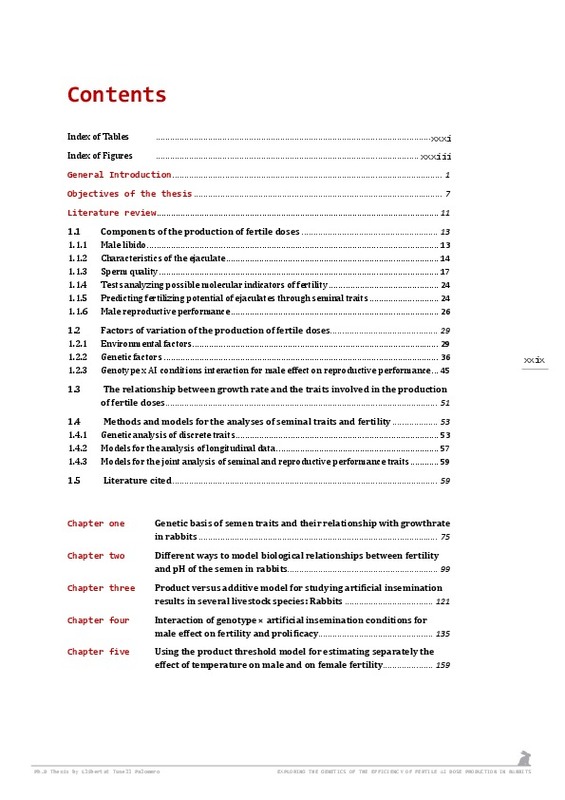- RiuNet repositorio UPV
- :
- Investigación
- :
- Tesis doctorales
- :
- Ver ítem
JavaScript is disabled for your browser. Some features of this site may not work without it.
Buscar en RiuNet
Listar
Mi cuenta
Estadísticas
Ayuda RiuNet
Admin. UPV
Exploring the genetics of the efficiency of fertile AI dose production in rabbits
Mostrar el registro sencillo del ítem
Ficheros en el ítem
| dc.contributor.advisor | Piles Rovira, María Mercedes
|
es_ES |
| dc.contributor.advisor | Lopez Bejar, Manuel
|
es_ES |
| dc.contributor.author | Tusell Palomero, Llibertat
|
es_ES |
| dc.date.accessioned | 2011-10-03T10:10:46Z | |
| dc.date.available | 2011-10-03T10:10:46Z | |
| dc.date.created | 2011-07-30T08:00:00Z | es_ES |
| dc.date.issued | 2011-10-03T10:10:36Z | es_ES |
| dc.identifier.uri | http://hdl.handle.net/10251/11842 | |
| dc.description.abstract | Exploring the genetics of the efficiency of fertile AI dose production in rabbits The general aim of this thesis has been to analyse sources of variation for some of the most important components of fertile artificial insemination (AI) dose production in order to explore the interest and limitations of different strategies for their genetic improvement in a paternal line of rabbits selected for growth rate. These components refer to seminal production and quality traits, being considered the male reproductive performance (fertility and prolificacy) as the final expression of the effect of the seminal characteristics and the effect of the interaction among them and with the female. Genetic analyses of the seminal traits involved in AI dose production and growth rate were modelled using threshold and linear multiple-trait mixed models. Relationship between fertility and pH of the semen was analysed either using mixed or recursive mixed models. Male and female genetic contributions to fertility were estimated using additive or product threshold models and both models were compared by its ability of predicting fertility data. Existence of genotype x artificial insemination conditions for male effect on fertility and prolificacy was estimated under a Character state model. Finally, the product threshold model was used for estimating separately the effect of the environmental temperature on male and on female contributions to fertility. All inferences of this thesis have been done under a Bayesian approach. Male libido and variables related to the quality of the ejaculate such as presence of urine and calcium carbonates in the ejaculate, individual sperm motility, semen pH and suitability for AI of the ejaculate (which involves the subjective combination of several semen quality traits) were found to be lowly heritable, but repeatable. | es_ES |
| dc.language | Inglés | es_ES |
| dc.publisher | Universitat Politècnica de València | es_ES |
| dc.rights | Reserva de todos los derechos | es_ES |
| dc.source | Riunet | es_ES |
| dc.subject | Artificial insemination | es_ES |
| dc.subject | (Co)variance components | es_ES |
| dc.subject | Fertility | es_ES |
| dc.subject | Male | es_ES |
| dc.subject | Temperature | es_ES |
| dc.subject | Bayesian | es_ES |
| dc.subject | Semen production | es_ES |
| dc.title | Exploring the genetics of the efficiency of fertile AI dose production in rabbits | |
| dc.type | Tesis doctoral | es_ES |
| dc.identifier.doi | 10.4995/Thesis/10251/11842 | es_ES |
| dc.rights.accessRights | Abierto | es_ES |
| dc.contributor.affiliation | Universitat Politècnica de València. Departamento de Ciencia Animal - Departament de Ciència Animal | es_ES |
| dc.description.bibliographicCitation | Tusell Palomero, L. (2011). Exploring the genetics of the efficiency of fertile AI dose production in rabbits [Tesis doctoral no publicada]. Universitat Politècnica de València. https://doi.org/10.4995/Thesis/10251/11842 | es_ES |
| dc.description.accrualMethod | Palancia | es_ES |
| dc.type.version | info:eu-repo/semantics/publishedVersion | es_ES |
| dc.relation.tesis | 3628 | es_ES |
Este ítem aparece en la(s) siguiente(s) colección(ones)
-
Tesis doctorales [5284]







![Text file [Text]](/themes/UPV/images/text.png)


